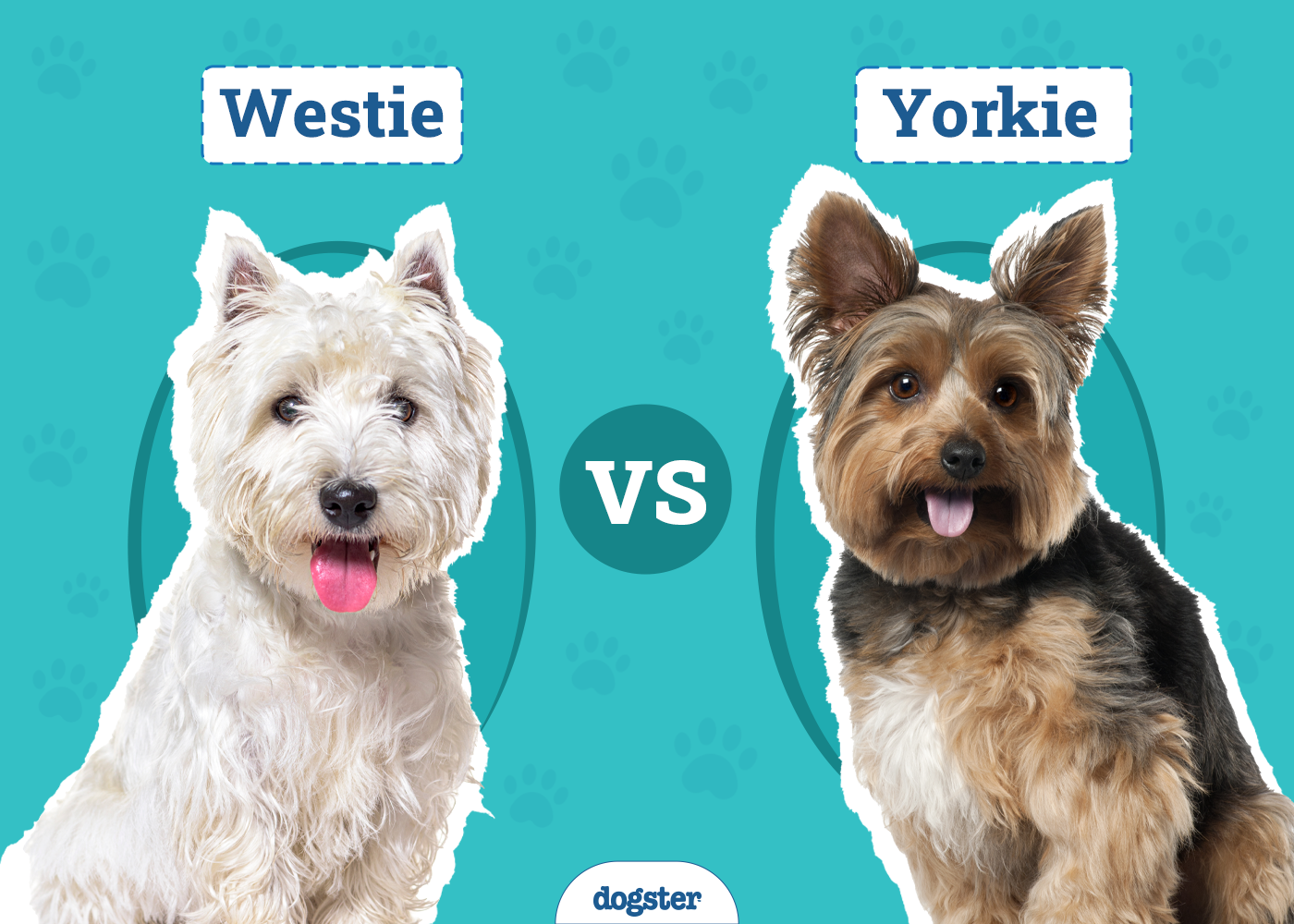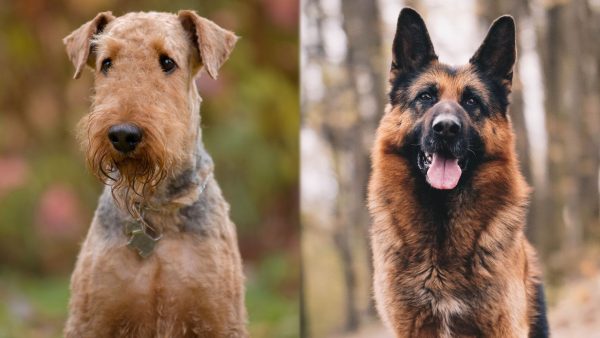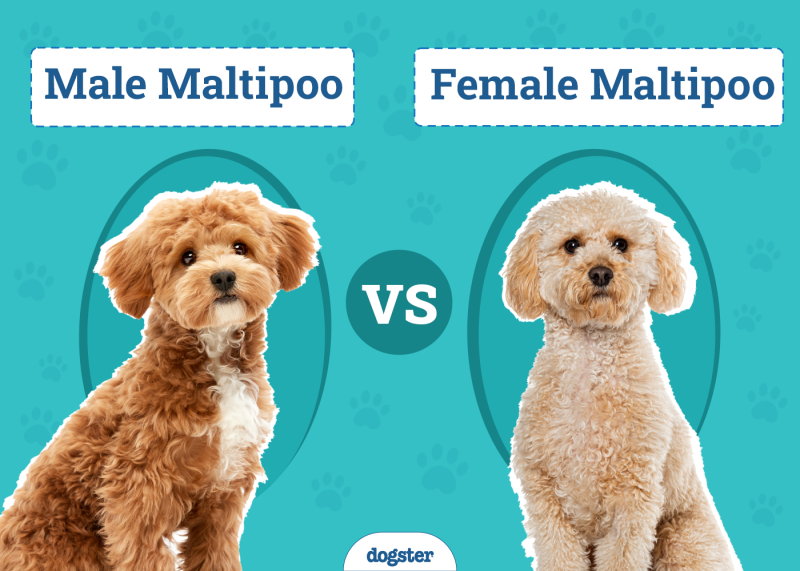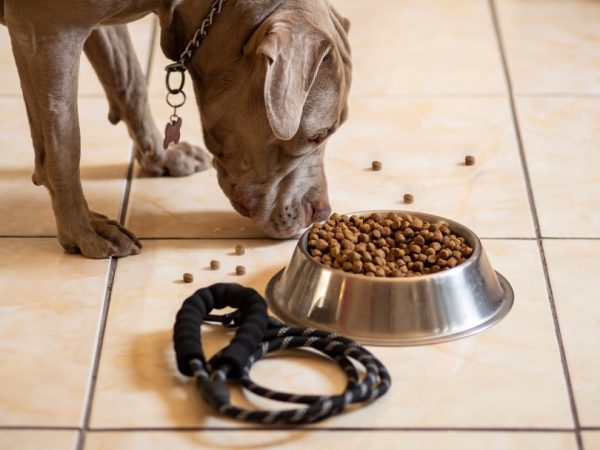In this article
View 3 More +The West Highland White Terrier (or Westie) is a very old breed native to Scotland. These charming dogs have been around for more than 300 years and have helped their owners in the traditional rat Terrier ways until fairly recently. Yorkshire Terriers (or Yorkies) originated from the Yorkshire county of Great Britain and were a firm favorite of Victorian ladies for their beautiful coats and sunny dispositions.
Both these Terriers were bred to catch vermin, but history has shaped them into two very distinct breeds today. In this article, we’ll discuss each and look at how they’re different!
Visual Differences
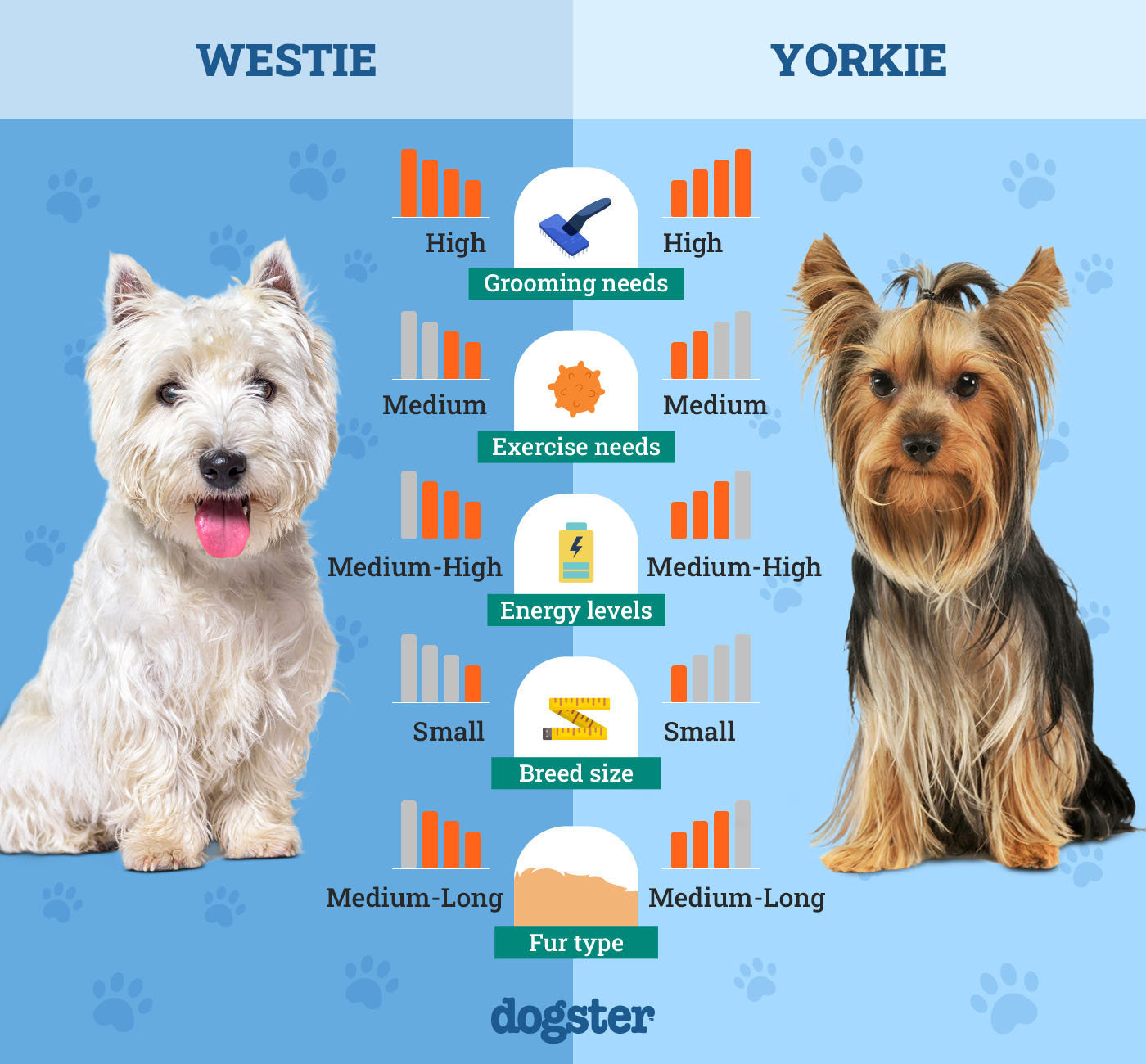
At a Glance
- Average height (adult): 10–11 inches
- Average weight (adult): 15–20 pounds
- Lifespan: 12–15 years
- Exercise: 1 hour a day
- Grooming needs: Moderate
- Family-friendly: Yes
- Other pet-friendly: Mostly
- Trainability: Alert, self-reliant, independent, faithful, intelligent
- Average height (adult): 7–8 inches
- Average weight (adult): 7 pounds
- Lifespan: 11–15 years
- Exercise: 1 hour a day
- Grooming needs: High
- Family-friendly: Yes
- Other pet-friendly: Mostly
- Trainability: Tenacious, brave, intelligent, feisty, eager to please

Westie Overview
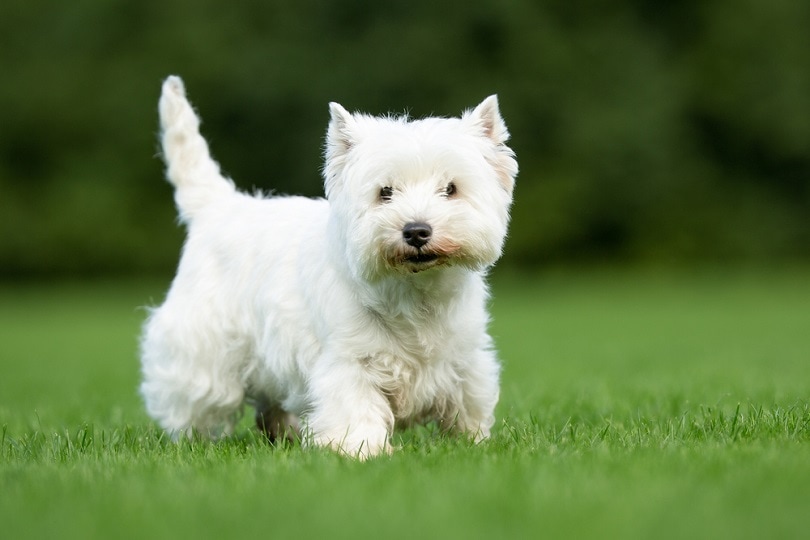
The Westie is one of the most popular breeds in the United States. The little white dogs have a distinctive look and a bold personality, making them great for families with active children. Westies are true Terriers that will chase anything with a tail.
Personality / Character
The West Highland White Terrier is a plucky, courageous dog that genuinely lives up to the Terrier name. They’re self-reliant and more independent than some small dogs, probably due to their origins working with humans to protect property from rats. Despite this independence, Westies are loving towards their families and make great playmates for children since they’re sturdy and filled with energy.
Chasing is hard-wired into the Westie; they love running after anything that moves! Westies are tough but faithful, and they don’t need pampering. However, that doesn’t mean they don’t crave affection; the Westie thrives on love and cuddles from their families. Confidence comes naturally to them, and they’re full of playfulness and charm.
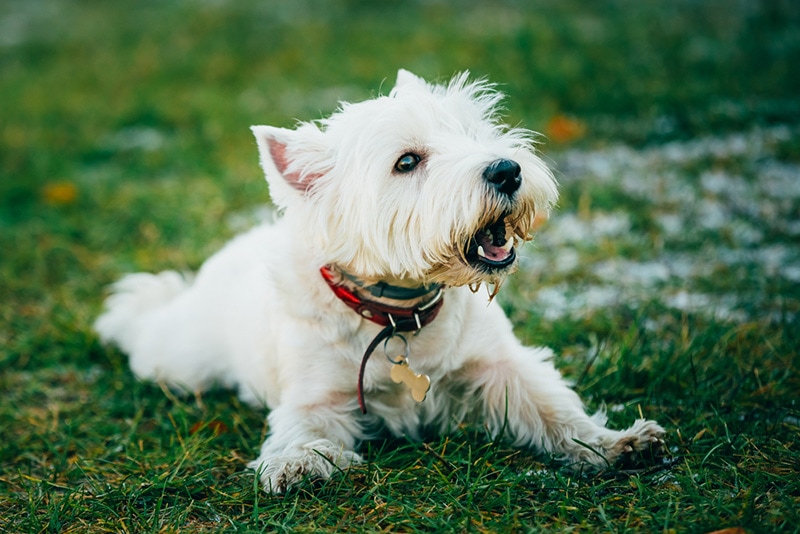
Training
Westies are independent since they were bred to work alone, but their confidence can get in the way of training. Westies are fiercely intelligent, but they know it! This can make training a challenge. Patience and persistence are essential when training a Westie; keeping lessons short and exciting can prevent them from becoming distracted.
Incorporating play sessions and keeping them upbeat can also hold the Westie’s attention. It’s essential to teach a West Highland White Terrier the recall command and walk them on a leash unless you’re 100% confident in their abilities.
Health & Care
The Westie is a healthy breed, but they’re vulnerable to a few conditions. Genetic testing by responsible breeders can reduce the chance of contracting congenital diseases, but other problems, unfortunately, cannot be avoided.
- Diabetes
- Obesity
- Ear problelms (otitis externa)
- Dental disease
- Craniomandibular Osteopathy
- Addison’s disease
- White dog shaker syndrome
- Skin problems and atopy
A Westie’s ears should be checked and cleaned weekly to prevent a build-up of dirt and wax that can cause infections. Brushing their teeth with dog-safe toothpaste should begin in puppyhood to prevent dental disease and inflammation. It’s important to check the skin between a Westie’s toes for soreness and inflammation when their laws are clipped, and flea treatments should be administered regularly since they can suffer from allergies and skin problems (some of which can be severe).
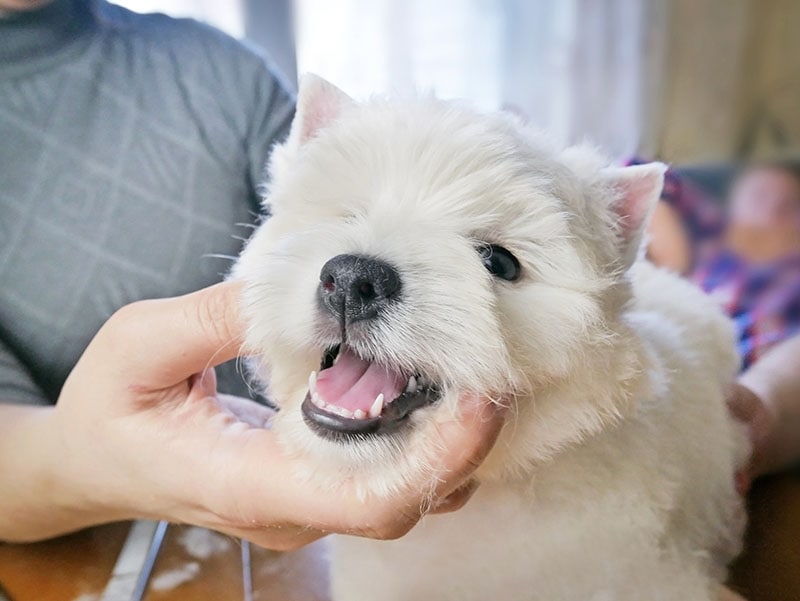
Grooming
Westies have a course coat that’s a brilliant white color. Daily brushing is needed as their skin is sensitive, so removing any tangles from the hard coat can keep them comfortable and the coat clean. A visit to the groomer (or a home clip) is usually needed once every four to six weeks, especially to tidy the hair around the eyes. Overbathing can cause problems for Westies, and they have sensitive skin; keeping bathing to a minimum will help prevent dryness and irritation.
Exercise
Westies are very playful dogs that are surprisingly energetic and active. They’re not big dogs, so a brisk walk twice a day is usually enough exercise for them if combined with a yard to run around in. Just ensure their exercise area is fenced in, as they’ll run and chase after any creatures crossing their path! Be wary of letting them run freely unless they have excellent recall; their terrier nature can make resisting the temptation to chase challenging. The Westie is athletic and intelligent, so they excel at dog sports such as agility, rally, and earth dog events!
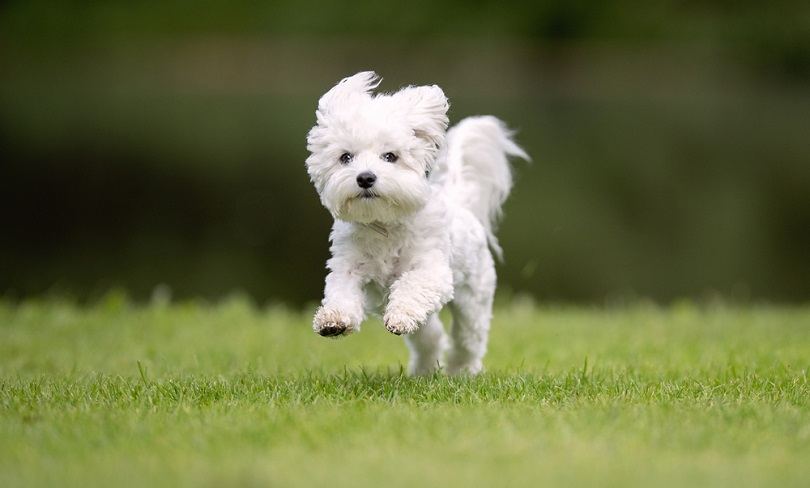
Suitable For:
Westies are great for active families who want a small breed that’s good with children. Families with large backyards are ideal pet parents, and those who want a confident but more independent breed will find a great companion in them. Westies are suitable for those familiar with the Terrier breed group and confident in training more independent dogs.
- Great with children
- Sturdy and confident
- Playful and loving
- Sometimes stubborn
- Self-reliant
- Can be tricky to train

Yorkie Overview

The Yorkshire Terrier has plenty of personality packed into their tiny, dainty frame. They’re instantly recognizable for their long, flowing, black-and-tan coats and diminutive stature, and the Yorkie is another incredibly popular toy breed in the UK and US.
Personality / Character
The Yorkie is an intelligent, eager-to-please dog that’s as feisty as they are fun-loving. Despite only weighing 7 pounds, they have a great character and a brave heart! They embody the ratting Terrier spirit and can be bossy and self-important, but they adore being close to their owners and love providing comfort and companionship.
They get along well with children, but small children may not be their best companions since Yorkies are so fragile. The Playful and charismatic Yorkies can be trained to be perfect watchdogs and have big voices for such little dogs!
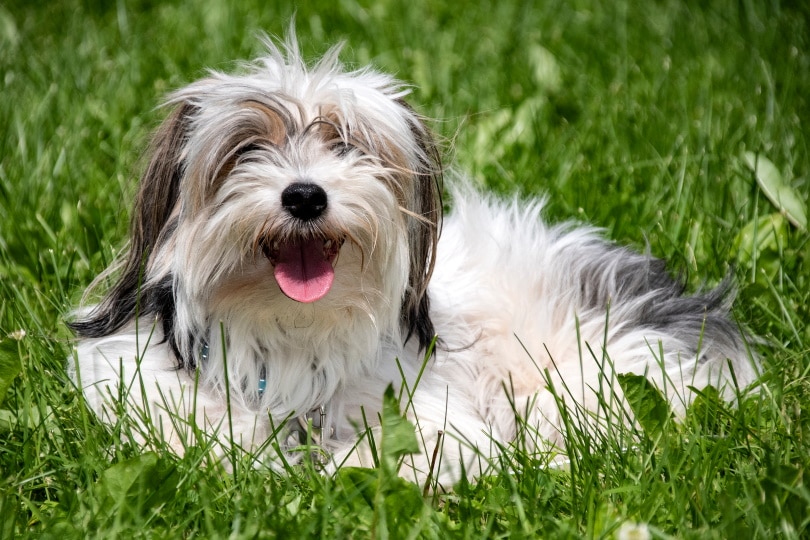
Training
Exposing them to various pets, people, and places at a young age is vital for Yorkies. Getting them used to different situations in a calm and positive way can help them feel confident in adulthood. Yorkies are intelligent and quick learners, but using praise and rewards are the best ways to train them. Yorkies love to please their owners and show them what they can do, so they’re great at obedience trials. Some Yorkies are even employed as portable therapy dogs!
Health & Care
Yorkies suffer from some common problems that other toy breeds experience. They’re relatively healthy, but the following are some of the conditions that potential Yorkie owners should look out for:
- Obesity
- Dental problems
- Periodontal disease
- Allergies
- Bladder stones
- Luxating patella
- Patent ductus arteriosus
- Tracheal collapse
- Portosystemic shunt
- Legg-Perthes disease
It’s vital to brush the Yorkie’s teeth after their baby teeth are gone since they’re prone to overcrowding and retained deciduous (baby) teeth as they have small jaws. This increases the likelihood of dental and periodontal disease. Regularly cleaning their ears is also important since long-haired breeds are more prone to ear infections!

Grooming
The long, flowing hair of the Yorkie needs extensive grooming to keep it neat and comfortable. Yorkshire Terrier fur is similar in texture to human hair, so taking care of it is similar to caring for our own! Daily brushing is necessary for long-haired Yorkies to combat knots and prevent matting.
Regular trimming is also needed to shape the fur, particularly around their eyes so that they can see! However, some Yorkie owners like to put their dog’s facial hair up in an adorable top knot! A puppy cut can dramatically reduce the grooming needs of a Yorkie, keeping it short while still looking adorable. With a short haircut, they’ll still need brushing, but it’s more manageable. Yorkies should be bathed around once a week to keep their fur healthy.
Exercise
Yorkies are tiny but energetic, so they’ll need daily exercise and play sessions. A brisk walk twice a day is more than enough exercise for the Yorkie, especially if they also play active games indoors. A fenced yard is also perfect because Yorkies love to run around and let off steam. Yorkies are great at dog sports such as agility, and their tiny size gives them a speedy advantage!

Suitable For:
Yorkies are suitable for families who want a tiny toy dog with a big personality. They’re better with older children, not because they’re aggressive, but because small children can easily accidentally hurt them due to their fragile bodies. Couples or elderly owners will find a loyal and entertaining companion in the Yorkie, and they’re suitable for apartment living due to their size. Owners should be prepared for extensive grooming to keep their Yorkie’s hair long.
- Small but bright
- Friendly
- Playful and loving
- Not ideal for small children
- Extensive grooming needs
- Can’t walk far

Which Breed Is Right for You?
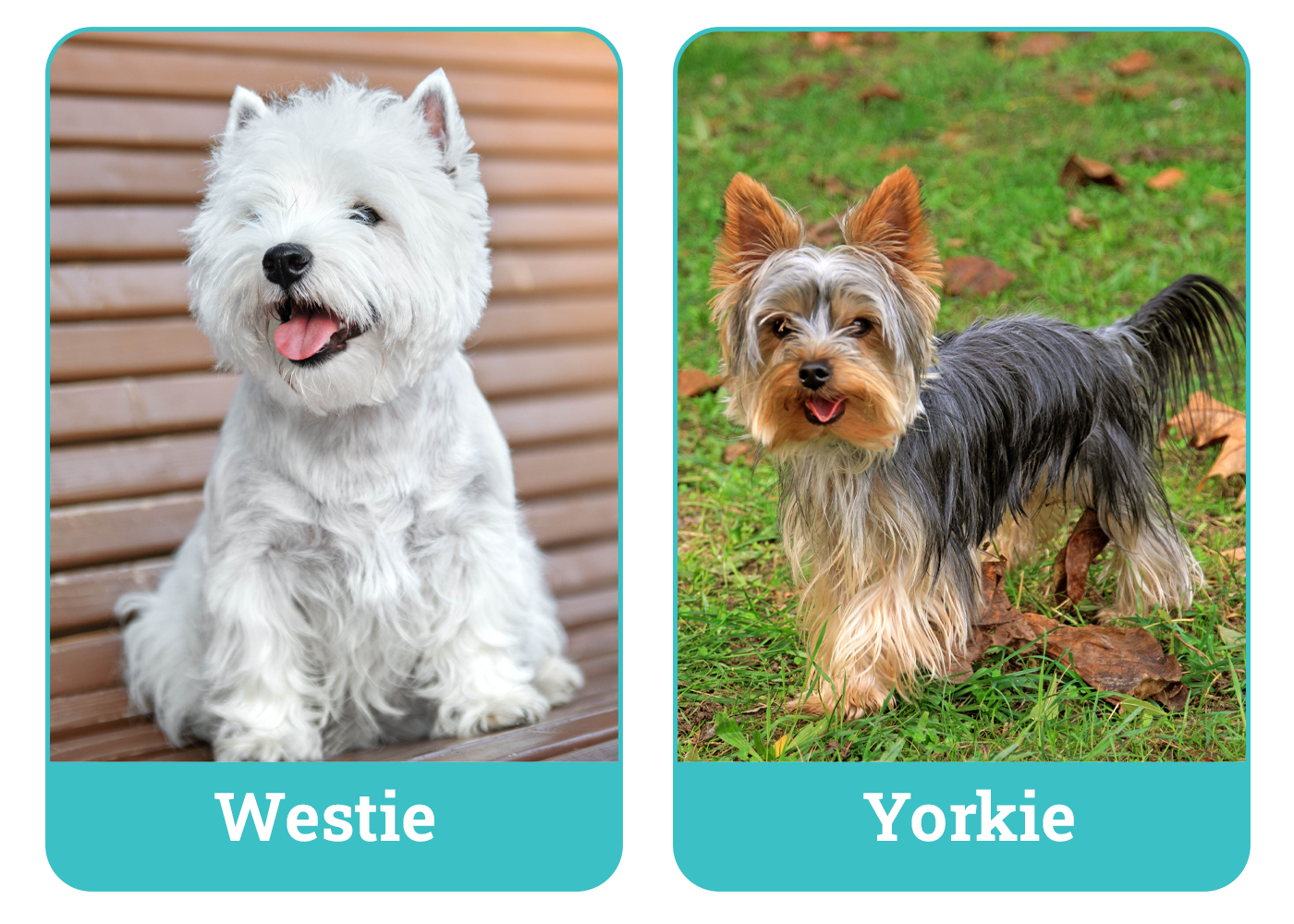
The Westie and the Yorkie are small dogs with big personalities but have some key differences. The more independent Westie is sturdy and strong and makes an excellent playmate for small children. They have fewer grooming needs than the Yorkie, but they also need extensive recall training to be allowed off-leash due to their strong urge to chase.
Yorkies are the tinier of the two, but they can be just as bossy as the Westies! Yorkies are less self-reliant than the Westies but still intelligent, lovable, and full of life. Yorkies are perfect companions for older children, but young children need to be careful of the Yorkie’s fragility. You must keep on top of a Yorkie’s grooming needs, even if they have a short coat. Choosing between a Yorkie and a Westie is difficult since they’re remarkable dogs that make excellent pets.
See also:
- Tooth Resorption in Cats: Causes, Signs, & Care (Vet Answer)
- Toy Poodle vs Yorkie: The Differences (With Pictures)
Featured Image By: Top – chriskeller, Pixabay | Bottom – Daria Turchak, Unsplash
